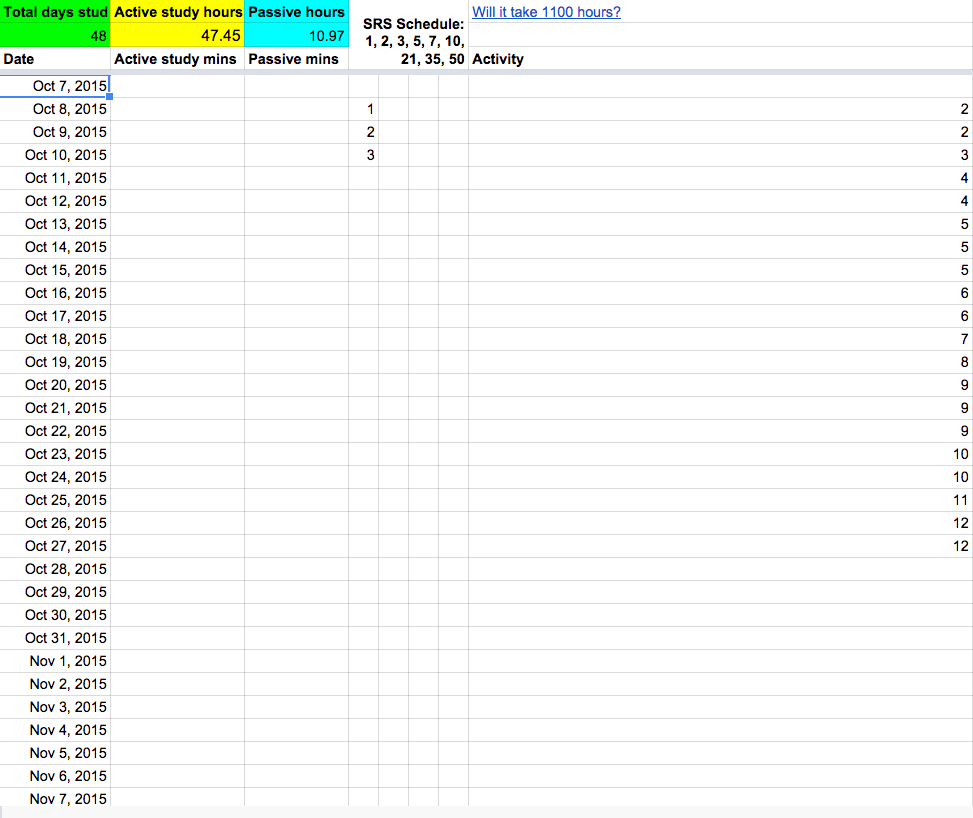Ollie's Burmese Language Learning Journey
As part of my own commitment to learning I'm trying to share some of my own learning projects through this blog. One of my current learning projects is learning Burmese.
Below is a series of ‘journal' entries that track how my study is going. They're a great record of an evolving study study method. Be aware that if a study technique is suggested, or a tip is given in one of the journal entries that doesn't necessarily mean that that is a tip or method that I am using today. The more recent the journal entry, the more developed the study approach (assuming I'm getting better at this caper!). The idea of this journal is to track the development of my study method and hopefully demonstrate that no single method is ever perfect and the important thing is constant hard work and reflection on progress. Enjoy!
To start off with, here is a study log with my record of active study time, passive listening time, and rough notes of what I did in each time period. Below you can see the journal in full.
April 27, 2015: S.A.(U).L.T., my learning approach, to a new project…Burmese!
OK, so, today I got some exciting news. I’ve just been accepted into an elective unit through my Masters in Teaching at the Melbourne Graduate School of Education that’s going to allow me to travel to, and teach in Myanmar for 2 weeks this coming November.
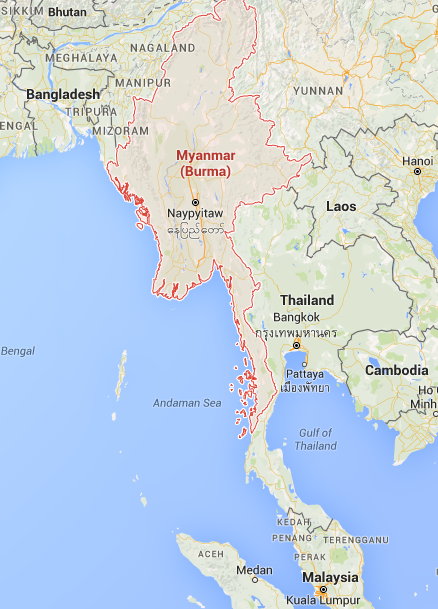
A new language project is upon me!
I thought it would be interesting to practice this new language, AND to log how much time I actually spend on it.
Following my S.A.(U).L.T (Survey, Acquire, Understand, Link, Train) framework I’ve justsurveyed the internet (by googleing ‘best learn burmese resources’) and found this article which looked good (it had the word ‘hacking’ in it, an indicator that the author was serious about efficient learning). That then linked me to this resource which I’ve now acquired. I then looked on my language exchange for language partners, but didn’t find any who speak Burmese in Melbourne, so I just googled ‘Burmese Carlton’ (I live in carlton) and the only results that came up were a curry restaurant. I did all of this to try to find a language exchange partner, which I still want to do, so this weekend I’ll go to that curry restaurant, have dinner there, practice my burmese that I’ve learned, and see if they know anyone who wants to do a language exchange.
Total time to date: 15 minutes. Now… to get stuck into ‘Understand‘. Wish me luck, I’ll report back in a week.
May 5, 2015: Don't forget to apply the learning model Ollie!
One day past the one week mark. It's been going well and I've only missed one day so far. Initially when I started out I was trying to learn how type Burmese and really get my head around the burmese script. I did this for 4 days but realised I was actually progressing really slowly and getting bogged down in the detail, so it was time to reflect on my learning process again. I realised what I was best off to do first was to survey the language and get a better feel for what it's all about. Construct a bit of a schema in my head of the language and see what kind of links I can make to previous knowledge, such as Mandarin. So I started a big pass through of the resource, which I estimate will take me about a month and a half at 15 minutes of new content, and 5 minutes of revision per morning. After that I can re-visit and go into more detail, learning the script etc.
But if I learned anything from learning Mandarin it's that I'll change my mind on what the best approach is in a pretty short time… so we'll see how I'm feeling next week. But there is one thing that I'm determined to do, that I wish I had done with Mandarin. That's find ONE good resource, including audio, and work through it from start to finish. So much time is lost around playing around with different and resources and chopping and changing. So here I am saying it, I aim to JUST use Burmese By Ear (which is excellent so far by the way) and hopefully that'll be a fantastic foundation in a little under two months of 20 minutes active study per day.
May 10, 2015: Let's study together
Day 13. Today I invite you to sit in on one of my study sessions. It might shed some light on how I do it, how much progress has been made, and how it's ok to feel like you haven't made that much progress sometimes! Errors are all part of the learning process. Enjoy : )
‘Our errors are surely not such awfully solemn things. In a world where we are so certain to incur them in spite of all our caution, a certain lightness of heart seems healthier than this excessive nervousness on their behalf.'-William James, 1897
May 23, 2015: Motivational speed bump
So. I've now been studying for 27 days (25 of which I've studied on) and a total of just over 8 hours of active study. Here are a couple of comments.
I've stopped doing bulk passive listening. The main reason for this is that I don't actually think it's that helpful. I think it does do something but I think that it's really overrated. I think that the necessary conditions for it to be successful are that you need to be listening to something that's within your Zone of Proximal Development, ideally something that you've already actively studied. I think that, for example, listening to news broadcasts in your target language (as I was doing) actually isn't a good use of time, even thought I just had them in the background whilst working, instead of the usual classical music.
With the above said, perhaps it seems like it would still make sense to do the passive listening, because it was just supplanting the classical music, so actually wasn't taking up any additional time. That's true, but part of the reason for me blogging about learning this language is to demonstrate how quickly and efficiently language learning can be done. I don't want people to think ‘yeah, you only took 100 hours to get conversational, but you actually did 1000 hours of passive listening!'. So I'm cutting it out, mainly to prove a point!
Today I hit a bit of a motivational speed bump. At the 19 minute point of my 20 minute study session I couldn't be bothered continuing and shut off the tape. This is maybe for a couple of reasons. One is that I have a heap of ideas of interesting projects going through my mind right now, and they're kind of distracting me. The other is because I feel that my brain is starting to hit a bit of a point of overload with the amount of content, and It's time for me to step back and bed some of it down a little stronger.
I think a good way to do this would be to do a language exchange with someone, and prepare for about an hour or so beforehand, really revising all of the things that I've studied to date.
So that's the project for today. Spend a bit of time actively searching out a language exchange partner… Wish me luck : )
May 24, 2015: Getting out of the slump and giving myself a break.
Following my little motivation slump yesterday, I decided to dedicate today's 20 minutes of study to motivation. First off I googled ‘Burmese Community Melbourne' and came across the Melbourne Myanmar Community Facebook page. I sent them a message in the hope that they know someone who would like to do a language exchange. So fingers crossed on that one.
In that same search I also found this great document giving an overview of Myanmar, as well as stories of Burmese people settling in Australia, and particularly Melbourne. I look forward to reading it.
After that (and after being reminded about the power of documentary last night, when I re-watched the must see ‘Our Generation' about Australia's treatment of its indigenous peoples) I searched for documentaries on Myanmar. ‘Burma Documentary' with the video filter, which yielded ‘Connecting Myanmar‘.
I plan to watch this documentary tonight and hopefully I hear back from the Melbourne Myanmar Community soon. To bring this back to my learning model, today I've attempted to address the ‘care about‘ element of the procrastination equation (related to motivation), by reminding myself of the relevance of this learning project. I'm already feeling more motivated to get back into my Burmese study! Let's hope it lasts till tomorrow morning!
June 4, 2015: Changing tack. Active study to date: 13.72 Hours.
Yep, so, as anticipated, it's time for a change of tack. I was up to unit 5 and I was finding that I really felt like the stuff from the first couple of units wasn't in my brain. I didn't notice this going through unit 1, 2 and 3, because the content from 1 was repeated quite well in 2, and unit 3 was quite short. But 4 changed topic quite a bit and by the time I was up to the unit 5.1 review the unit 1, 2 and 3 stuff was getting pretty hazy. So, change of plan.
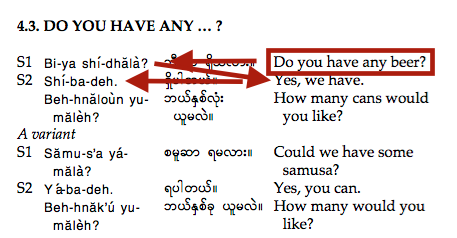 Right now I'm reading through the first few units, making sure I understand what's going on, and making Anki cards for each of the new vocabulary items. Note, when I say ‘reading through' what I actually mean is I basically just go to the relevant dialogues (or vocabulary lists) and looking at the english first, trying to recall the burmese, speak out what I think it is, then check my answer. As such, my eyes follow this pattern on the page, where I start by looking at the red box (see image above), talk out what I think the answer is, check it by looking left. Then look right to the next line down and read the english sentence, speak out what I think the Burmese is, then look left again to check.
Right now I'm reading through the first few units, making sure I understand what's going on, and making Anki cards for each of the new vocabulary items. Note, when I say ‘reading through' what I actually mean is I basically just go to the relevant dialogues (or vocabulary lists) and looking at the english first, trying to recall the burmese, speak out what I think it is, then check my answer. As such, my eyes follow this pattern on the page, where I start by looking at the red box (see image above), talk out what I think the answer is, check it by looking left. Then look right to the next line down and read the english sentence, speak out what I think the Burmese is, then look left again to check.
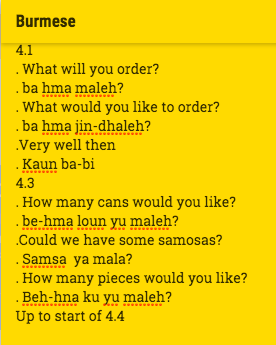 For any sentences that I recall correctly, I pat myself on the back, for any sentences that I recall incorrectly, I add them to google notes as is pictured on the right. Then what I do when I have some free time is just scroll down the page, revealing english firs, saying it out in Burmese, then checking my answer.
For any sentences that I recall correctly, I pat myself on the back, for any sentences that I recall incorrectly, I add them to google notes as is pictured on the right. Then what I do when I have some free time is just scroll down the page, revealing english firs, saying it out in Burmese, then checking my answer.
So the basic summary of my current technique is as follows. Start a new lesson and 1: Listen through that lesson, pausing after every English prompt and trying to say the Burmese. 2: Read through the lesson (as outlined above) adding new vocabulary items to Anki (and ALWAYS making a mnemonic for each word) and adding any sentences that I didn't get correct to my google notes. 3: Once I'm up to the unit review, do it 3 days in a row (twice on the first day, once for the second and third days) then put it onto my SRS schedule. Hopefully this will allow me to retain the info better.
ALSO, exciting news. Two days ago I got to use Burmese for the first time in context! A delegation from Phaung Daw Oo (The school that I'll be teaching at at the end of the year) came to Melbourne to explore partnership opportunities with different organisations and we had the opportunity to meet them. I was able to say ‘How are you?', ‘Take a photograph', ‘Do you want to eat?' and, ‘It's very cold isn't it' at appropriate times! However, I learned that the way that I said ‘It's very cold isn't it' – theik e'deh naw? – was actually the informal between friends version. What I should have said (to strangers) was ‘A-yan e'dah naw?' (A-yan being the formal version of theik, meaning ‘very'). But the people I was speaking to, Moe and Caiq Su were very kind about it.
June 21, 2015: Turning Point
This weekend I've been attending an event called Turning Point. It's run by Authentic Education and is all about re-focussing, considering your priorities and taking the steps needed to live your love. Prior to the conference I was having some thoughts about my Burmese Learning project, and have sorted through them a bit more over the last day.
The project is a large investment of time. I've been spending minimum 20 hours per day on this and have been making great progress, but the real question is, what is the opportunity cost of that time investment?
Recently my blog posts on other topics have waned through my focus on Burmese, and I've realised that I believe my time would be better invested in skills and content that are going to yield long term payoffs. My teaching placement in Myanmar is only going to be 2 weeks long, and I know that upon returning home it would be a large time commitment to try to maintain two languages, Mandarin and Burmese. And I'm still a long way away from my goal of being at work-level proficiency with my Mandarin!
 As such, I've decided to really scale back my Burmese learning project. I'll spend a couple of hours in the next week or so activating the Anki cards (i.e., turning them from suspended to active) that contain the vocabulary items that I've already learned to date, so that I don't lose that valuable knowledge that I've already put so much time into, and I'll sporadically listen to BBE to try to keep some of the grammar and phrases fresh in my mind. But I'll basically put my Burmese on maintenance (simply via Anki) until a short time out from my visit when I'll punch through BBE a few times intensively and will go to Myanmar with those basics well mastered.
As such, I've decided to really scale back my Burmese learning project. I'll spend a couple of hours in the next week or so activating the Anki cards (i.e., turning them from suspended to active) that contain the vocabulary items that I've already learned to date, so that I don't lose that valuable knowledge that I've already put so much time into, and I'll sporadically listen to BBE to try to keep some of the grammar and phrases fresh in my mind. But I'll basically put my Burmese on maintenance (simply via Anki) until a short time out from my visit when I'll punch through BBE a few times intensively and will go to Myanmar with those basics well mastered.
Sometimes the survey phase of learning includes re-prioritising, and surveying the options that are facing you at a given crossroads, and pivoting. That's what I'm doing at the moment with my Burmese, and I'm feeling really good about it. Those 20 minutes a day saved will now be focussed on more education content and making this blog a more valuable resources to learners and teachers. I'm excited!
October 7, 2015: One month before departure. My plan of attack! (Study method refined)
It's October 7th and November 7th is departure date. For the last 2 months or so I've been passively listening to the Burmese By Ear recordings for about 15 mins per night whilst I make my lunch for the following day. Now it's time to ramp things up. I've made a schedule for turning the entire Burmese By Ear course into Anki cards, it can be seen below (numbers on the right correspond to chapter numbers, there are 12 chapters in total in the course).
This schedule should have me done with the entire Burmes By Ear course on Oct 28th, with plenty of time to revise the whole course leading up to the 7th. My goal is to be able to say every phrase in the course without significant delay by the time I get to Myanmar. This should provide a strong foundation for communication as soon as I land. Here's the contents of the course as an overview of what I hope to have mastered by November 7th.
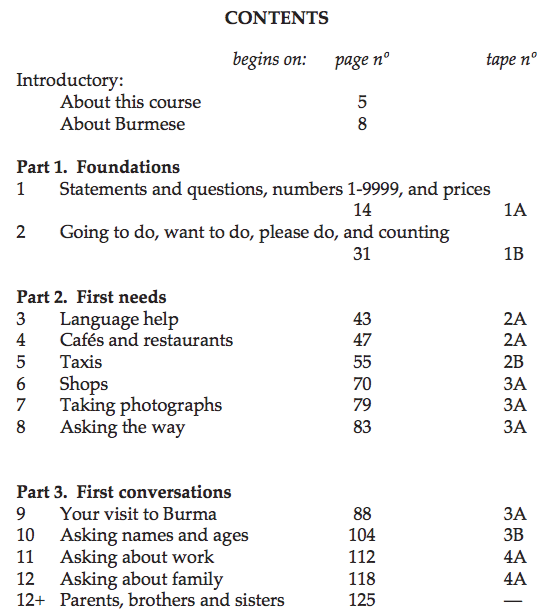 I've allocated 30 minutes every morning to this task. I'm hoping that that's sufficient for me to be able to turn the phrases into the cards (I've allocated approx 15 minutes of ‘tape' to each of the 30 minute sessions). I'm sure I'll have a pretty good feel for how I'm tracking after the first day or two.
I've allocated 30 minutes every morning to this task. I'm hoping that that's sufficient for me to be able to turn the phrases into the cards (I've allocated approx 15 minutes of ‘tape' to each of the 30 minute sessions). I'm sure I'll have a pretty good feel for how I'm tracking after the first day or two.
I've been refining my language study method over this year, and it's now to the point where I feel it worth sharing. In the following video I show you how I conduct a typical 30 minute study session, inclusive of adding new phrases to a spreadsheet, importing that spreadsheet into Anki, revising the phrases before putting them into the standard Anki spaced repetition sequence (what I call ‘in circulation'), and then using the Anki spaced repetition function in order to revise content. It's a pretty comprehensive video, I hope you get something out of it.
I'll post again in about 2 weeks to say how I'm tracking and whether I think I'm going to hit my target. Wish me luck!
October 26, 2015: 2 weeks before departure, Burmese language progress
So, 2 weeks out. Quick update.
Progress is coming along well. Tomorrow morning I will have made Anki cards for the whole of the Burmese By Ear course and it’ll be time to get stuck into revising. Happy I’ve stayed on track up till this point. But there’s still a lot to do…
I’ve put together a screencast with a bit more detail (actually, a lot more detail) about my studying approach. It includes one morning Anki card making session, and one Anki revision session. So it’s what you could call one ‘study cycle’ I guess. The Anki revision session includes not only my Burmese content but also my cards from all other languages and most of my other decks, so you’ll be able to see all of the other topics that I’m using Anki to stay on top of also.
WHY SO MUCH DETAIL OLLIE?????
When I was starting out learning Mandarin I was super inspired by other language learners like Scott Young and Benny Lewis , but I wanted more detail on exactly what they did in their study sessions, and always had trouble finding it. As I refine my own method, I’m keen to try to share some of this fine-level detail with others who are curious. The screencast in this post has been created for just this reason.
Enjoy!
